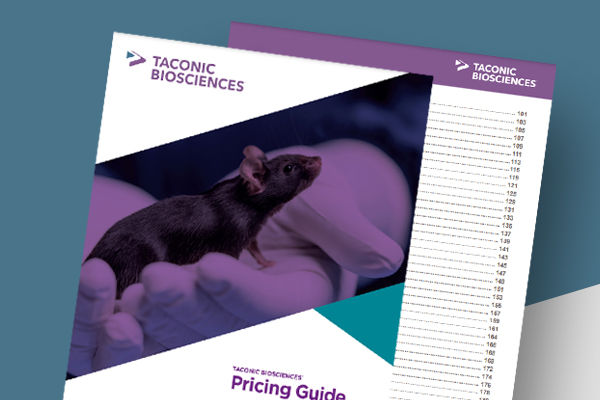| Model No. | Nomenclature | Genotype |
|---|---|---|
| 4197 | B6.Cg-Tg(Lck-cre)1Cwi N9 | Inquire for genotype |
Lck-cre Transgenic

- Description
- Price & Licensing
- Overview
- Genetics
- Guides & Publications
- Applications & Therapeutic Areas
- Transit, Housing & Welfare
Overview
Nomenclature: B6.Cg-Tg(Lck-cre)1Cwi N9
In order to selectively inactivate genes in a tissue specific manner many laboratories have developed Cre transgenic mouse strains in which the Cre recombinase is expressed under the control of a tissue specific promoter. The Lck-Cre transgenic mouse uses the proximal promoter of the Lck (lymphocyte protein tyrosine kinase) gene, which is first expressed early in thymocyte development at the double negative stage. After T cells fully mature, the level of expression of this transgene decreases by approximately 10 fold. This particular mouse shows a high degree of expression of the transgene in the thymus and has been found to bring about the selective deletion of genes flanked by loxP targeting sequences in almost all early thymocytes. It thus will be useful for experiments designed to delete a specific gene in the T cell lineage starting at the double negative stage. Since the Lck-Cre transgene in this strain has been made homozygous, one can simply cross the mouse to any strain containing a floxed gene of interest and obtain offspring that have deleted it in this tissue specific manner. If your strain is heterozygous, you can also obtain control animals in the same litter by typing for the presence or absence of the floxed gene in genomic DNA tail samples. Dr. Chris Wilson has recently discovered that his Lck-Cre transgenic mouse can cause partial to complete deletion in non-lymphoid tissues in some mice on certain backgrounds. These occurrences are unpredictable, but are apparent in tail DNA samples. Investigators should determine whether this abnormality is present in their crosses. Aberrant deletion had not been observed with the Cd4-Cre mouse (line 4196) developed by Dr. Wilson.
Note:This model has replaced Model 4204-M. It has been further backcrossed to C57BL/6 for a total of 9 generations.
Origin
This model is cryopreserved and available for recovery. Models can typically be recovered and delivered to customers within 12 weeks after order receipt. Purchase of this model includes perpetual use rights and a deliverable of four mutant animals at the Murine Pathogen Free™ health standard along with a genotyping protocol. For models which include a recombinase gene or multiple alleles, all alleles will be provided, but individual animals may not contain all mutant alleles.
Taconic’s Colony Management experts can design a plan to grow your colony faster.
Genetics
Guides & Publications
Initial Publication: Lee PP, Fitzpatrick DR, Beard C, Jessup HK, Lehar S, Makar KW, Perez-Melgosa M, Sweetser MT, Schlissel MS, Nguyen S, Cherry SR, Tsai JH, Tucker SM, Weaver WM, Kelso A, Jaenisch J and Wilson CB. A critical role for Dnmt1 and DNA methylation in T cell development, function and survival. Immunity Nov 2001:15(5) 763-74.
Applications & Therapeutic Areas
- Immunology
- Inflammation
- Recombinase-mediated Gene Deletion
Transit, Housing & Welfare
Need more info? Click the live chat button or Contact Us
- Licensing
- Pricing
- Select my Health Standard
- Get Custom Pricing Guide
Licensing
Nonprofit Users: Nonprofit users may access the line subject to the Conditions of Use below. The line is available for immediate cryorecovery for nonprofit users; cryorecovery fees are additional.
- MICE will be used for research use and not for a Commercial Purpose.
- MICE will not be distributed to third parties.
For-Profit Users: Use of MICE by for-profit entities or for Commercial Purposes requires a license from The University of Washington prior to shipping. Please contact Ariadna A. Santander (filimus@uw.edu). Once a license has been executed, Taconic may cryorecover the line. Cryorecovery fees are additional.
Commercial Purpose means: uses of the MICE by any organization, including Recipient to perform contract research, screen compound libraries, produce or manufacture products for general sale, or to conduct research activities that result in sale, lease, licenses or transfer of the MICE to a for-profit organization. However, industrially sponsored academic research shall not be considered a use of the MICE for Commercial Purposes per se, unless any of the above conditions of this definition are met.
In no event shall Taconic or University of Washington be liable for any use of the MICE, and recipient hereby agrees to defend, indemnify and hold Taconic and University of Washington harmless from any loss, claim, damage, or liability which may arise from Recipient's use, storage and disposal of the MICE.
This model is available for cryorecovery. A deliverable of 4 mutant mice is available 14-16 weeks after order for $5,500 / €5,500. Fees for Taconic Transit Cages and freight are in addition to this price.
Select my Health Standard
Need help choosing the right Taconic Biosciences health standard for your research?
Use the Health Standard Selector to enter your exclusion list. The tool will tell you which health standards meet your requirements.
Get custom pricing guide
Schedule A Scientific Consultation
Speak with a PhD-level Field Application Scientist who can help you select the most appropriate model and maximize your experimental success.















.jpg)

.jpg)
.jpg)
.jpg)
.jpg)





.jpg)


.jpg)
.jpg)

.jpg)


.jpg)





.jpg)

.jpg)




